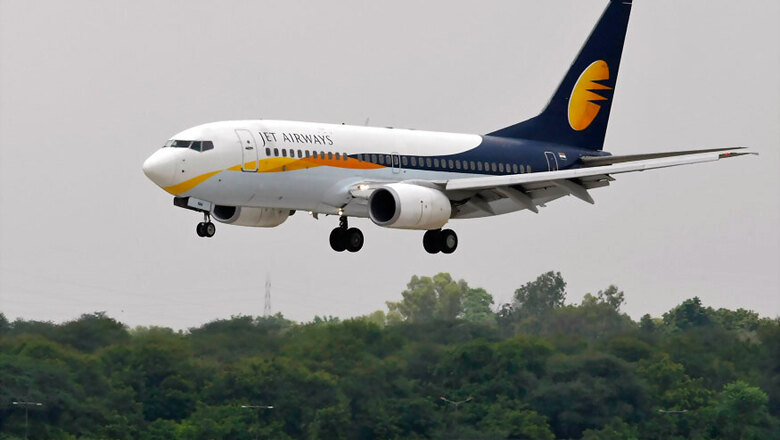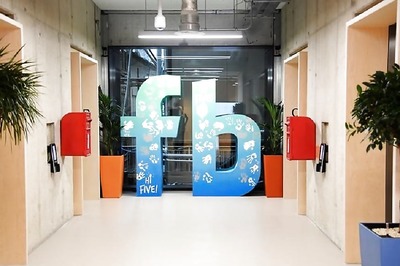
views
New Delhi: A high-stakes General Election is round the corner and the prospect of India’s second-largest airline by passengers going down just when the incumbent government would be seeking votes is not an appealing one, to put it mildly. So the Modi government has been handholding Jet Airways for the last few months in its journey to survive after the airline ran up significant dues to creditors and was unable to make scheduled payments to aircraft lessors as well as employees. In doing its bit to save Jet from getting grounded, has the government bitten off more than it can chew? It seems to be turning a blind eye to standard procedures, risking public money in some instances and offering Jet concessions not seen in the past in similar instances.
Two other airlines have been in nearly as precarious a state as Jet is in now, at different points in time. First it was the Kingfisher Airlines, which was facing acute shortage of funds to conduct its daily operations amid a rapidly dwindling active aircraft fleet in 2012. Promoter Vijay Mallya lobbied hard for India to ease its foreign direct investment (FDI) restrictions so that a foreign airline rescue could be scripted but the UPA government would not budge and the airline was finally grounded in October 2012, never to get back in the skies again. Events after the demise of Kingfisher are well known, including the massive haircut banks have been left with and the fugitive status of Mallya, which continues till date.
The second instance of an airline in deep trouble emerged two years later, when SpiceJet was similarly gasping, short of funds to continue daily operations amid creditors, aircraft lessors and others at the door to recover dues. But in this instance, the NDA government bent over backwards to help SpiceJet survive. It stitched together a plan along with businessman Ajay Singh for the rescue of SpiceJet, allowing a crucial open offer waiver for Singh to buy out the Marans (who were the promoters then), asking oil companies and airport operators to hold off on their dues and quickly lifting a brief restriction on forward sales announced by the DGCA.
A similar sort of all-hands-on-deck approach is visible in the case of Jet too, where the government seems to be erring on the side of caution. Consider the government’s steady refusal to restrict forward ticket sales by Jet Airways. Calls for such a restriction have come amid almost daily reports of the airline grounding more aircraft due to inability to pay lease rentals. Put simply, this means hundreds of scheduled flights are cancelled — inconveniencing the flying public. Shouldn’t fliers know well in advance if their flights booked in advance are likely to remain on the ground? Especially since other Indian airlines (at least two) have already said they wouldn’t consider bookings from Jet?
The airline has cancelled around 300 daily flights this month already, citing “operational reasons”.
A senior government official had said on Thursday that the government was not considering any restrictions on forward sale of tickets by Jet because first, it would create panic in the industry and second, because the airline was already under strict monitoring as it was now required to publish its schedule each month. The official had gone on to say that the airline had no significant dues with airports or oil companies and was using the “cash and carry” mode wherever necessary (which means making payments for purchases on a daily basis versus under the normal credit cycle).
The government’s over indulgence in Jet’s affairs also becomes evident when one considers the bailout plan, which involves lenders, including state-owned banks and a government investment fund called NIIF (National Investment and Infrastructure Fund) picking up more than 50% stake in Jet for a princely sum of Rs 1. This, in turn, means the airline will be indirectly funded by the Indian taxpayers in case this plan gets implemented, and the taxpayers will have no say in the matter. India is perhaps getting its second state-owned airline through such a bailout plan.
Several questions are already being asked about this bailout plan pushed by the government. First, why should state-owned banks, not in the pink of health anyway, be taking a substantial haircut? And why then should they convert their loans into equity in a business which has been known to be a high risk one globally? Besides, there have been recent reports of the smaller state-owned banks in this puzzle who have been reluctant to swap their loans for an equity stake and now, the SBI and other big banks in the lenders’ consortium are offering to buy out the loans from these small banks.
There is also the issue of Etihad Airways, the Abu Dhabi-based existing equity partner of Jet, setting some conditions for the bailout plan to get its nod. All in all, the entire plan seems to be stitched in a hurry, with little consideration about how banks would recover the huge sums they lent to Jet.
Anyway, India’s airline industry has almost always been a very tough market, known for wafer-thin margins and volatile cost structures. Besides, the market leader (IndiGo) accounts for more than four in 10 passengers, leaving six other players in a crowded market with not enough leeway. How do lenders see any return on their equity investment in the near future in a market where costs are volatile and high, profitability seems to be ephemeral and consolidation the only way forward?
Stakeholders are bound to ask: If banks and other lenders are being asked to convert their loans into equity in Jet, will they be doing the same thing for Air India — which has multiple times more debt on its books than Jet and is wholly owned by the government? Questions also remain about the government’s continued reluctance to open up Indian airlines to foreign airline investment beyond 49% when Indian airlines are crying out for massive fund infusion and Indian investment is hard to come by. As per existing FDI caps, foreign airlines cannot hold more than 49% stake in an Indian carrier though together with foreign non-airline investment the total foreign holding in an Indian airline can go up to 100%.



















Comments
0 comment